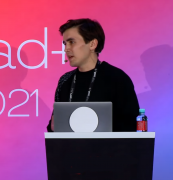PGConf.Russia 2021
PGConf.Russia is a leading Russian PostgreSQL international conference, annually taking together more than 700 PostgreSQL professionals from Russia and other countries — core and software developers, DBAs and IT-managers. The 3-day program includes training workshops presented by leading PostgreSQL experts, more than 40 talks, panel discussions and a lightning talk session.
Thems
- PostgreSQL at the cutting edge of technology: big data, internet of things, blockchain
- New features in PostgreSQL and around: PostgreSQL ecosystem development
- PostgreSQL in business software applications: system architecture, migration issues and operating experience
- Integration of PostgreSQL to 1C, GIS and other software application systems.
Talks
Talks archive
-
 Gregory Smolkin PostgresPro
Gregory Smolkin PostgresProPostgreSQL maintenance without backups is unacceptable. The constant growth of PostgreSQL clusters in maintenance creates new issues and bottlenecks for the chosen backup scenario. In this presentation, we will explain how to efficiently use pg_probackup under such circumstances.
-
 Daniil Zakhlystov Яндекс.Облако
Daniil Zakhlystov Яндекс.ОблакоPostgreSQL protocol compression has been discussed in the community for a long time. Many different hypotheses have been expressed and tested, and the compression patch has received a large number of changes and improvements. I will review the various approaches tested during the implementation of protocol compression, and will highlight the current status.
-
 Dmitry Vasilyev PostgresPro
Dmitry Vasilyev PostgresProIn OZON, we work on PostgreSQL as a service. Currently, we have thousands of clusters. We know about the important questions software developers ask, and the most crucial ones are as follows: how to understand the database's workload and why this query is getting slow? In this presentation, I will explain how we help our developers answer these questions by simply having a look at our dashboard.
-
 Vladimir Surdin МГУ
Vladimir Surdin МГУWe are surrounded by myths, so we are constantly under delusion in regard to politics, economy, history and... space. Let's tackle the most pressing issues related to astronomy and space research. Perhaps we will start to better understand the world around us, avoid exaggerated sensations and spot really interesting and attractive aspects of scientific research.
Photos
Photo archive